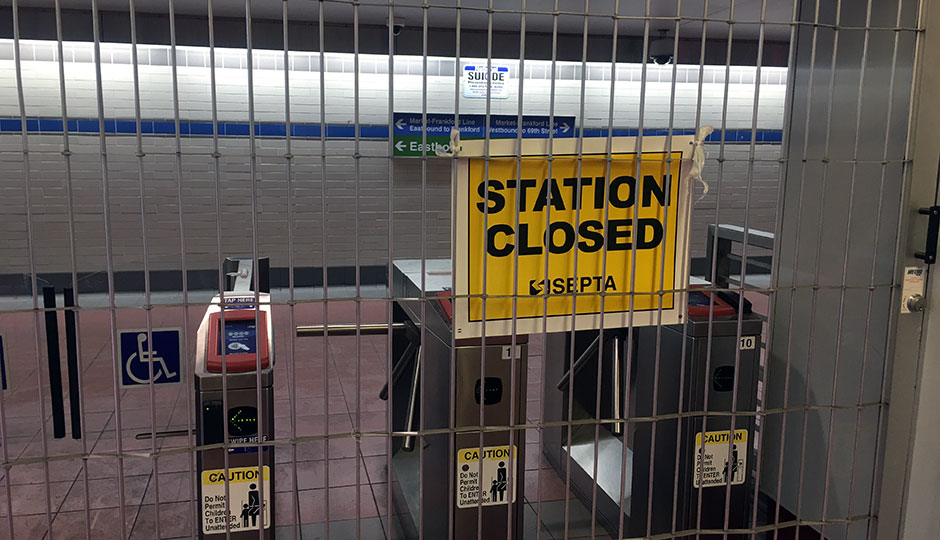SEPTA Asks Court to End Strike

The entrance to the City Hall and 15th Street stations in downtown Philadelphia is closed during the SEPTA strike | Photo: Dan McQuade
SEPTA is trying to resolve the transit union strike by turning to the courts, but struck out in its first attempt at convincing a judge to force workers to go back on the job.
Calling the strike “a clear and present danger to the health, safety and welfare of our riders and the citizens of Philadelphia and the region,” SEPTA filed an injunction Fridays afternoon, seeking an immediate halt to the strike by Transit Workers Union Local 234.
A hearing was hastily arranged inside a City Hall courtroom, where lawyers for SEPTA had four witnesses testify about the impact the strike has had on commuters, from elderly and disabled residents who rely on its paratransit services to get to doctor’s appointments, to an estimated 55,000 school children who take public transportation to school during the week.
After nearly two hours of listening to arguments about the strike’s effect on the city, Common Pleas Court Judge Linda Carpenter denied SEPTA’s request. She said the agency had not presented sufficient evidence that the strike presented “clear and present danger” to city residents. But the hearing will resume at 9:30 Monday morning, and Carpenter noted she was not dismissing SEPTA’s request outright. If its lawyers present more compelling evidence, her ruling could change.
SEPTA’s attorneys initially tried to argue that Carpenter needed to grant the injunction because the strike could theoretically prevent voters from reaching the polls on Tuesday, but the judge pointed out the strike could be resolved over the weekend.
“I think that the judge was very clear today that there’s no competent evidence, at least at this point, of the legal standards of Pennsylvania for irreparable and immediate harm to the public safety, health and welfare sufficient to issue an injunction,” said Nan Lassen, an attorney for Local 234. “We recognize that strikes are inconvenient. We recognize that strikes cause people to endure conditions that frankly they’d rather not endure, and the union would rather they not endure. But that is not a basis under Pennsylvania law to grant an injunction against striking employees.
Ralph Teti, another Local 234 attorney, disagreed with SEPTA’s argument that the strike could prevent people from voting. “I don’t think there’s any issue with respect to elections. In the city of Philadelphia, nobody takes the bus to vote in their voting precinct.”
“Job number one is to settle the strike, and we’re continuing to work on that around the clock, and working very hard with the union to do that,” said Gino Benedetti, SEPTA’s general counsel. “But as importantly is our passengers, and we’re not going to lie down while we can’t resolve this strike and just watch our passengers suffer. Not going to do it. It’s too important to get people who can’t get any other rides, who can’t afford the Ubers and the Lyfts, and got to get to medical appointments.”
Earlier in the day, Willie Brown, president of Local 234, issued a statement about the news:
“A bargaining session between SEPTA and our union is scheduled for 6 pm today. That’s where our focus should be — not on legal maneuvers that have no merit.
We will fight SEPTA’s request for an injunction tooth and nail. We would prefer, however, to concentrate our attention on productive bargaining to reach a fair settlement. At this point, only a handful of issues separate the parties.
Retirement security for our members is one of the issues still outstanding. The fact remains that our union caught SEPTA management with their hands in the cookie jar, rewarding themselves with pension increases averaging $500 a month.
It appears that SEPTA’s plan all along was to avoid real bargaining while relying on legal tricks. Until recently, they demanded that our members bring home less money in the new contract than under our previous agreement.
We are committed to bargaining a new agreement as soon as possible. That will happen at the bargaining table — not by rushing into court in a pointless attempt to restrict workers’ rights.”
Follow @dhm on Twitter.
Additional reporting by David Gambacorta.